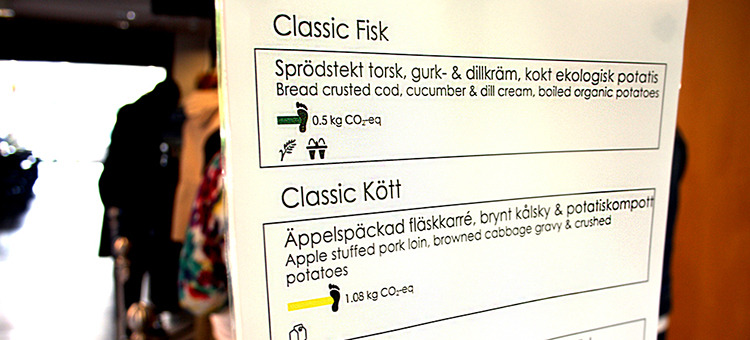
Introducing David Bryngelsson and his web based calculation tool for climate friendly restaurant menu planning, helping chefs to create smart dishes and menus while involving customers in the process.
"Commercial success is a prerequisite to get to where you want to go, but it is not a goal in itself."
CarbonCloud is deeptech of the week and one of the 12 winners of the 2017 ÅForsk Entrepreneurial Scholarship.
ENTREPRENEUR: David Bryngelsson
Business idea
Helping businesses and private consumer to calculate, track and understand their climate footprint in real time. First suit of impact services being CarbonAte, reducing emissions caused by food.
The demand in data, surprisingly high
With a background in climate change mitigation research, David has specialized on research in the food sector, allowing him to play a part in the public discourse on food and climate.
– A discourse that at times has been unnecessarily polarized problem focused. From this the idea arose that my colleagues and I actually have acquired lots of information that is relevant for the food sector to be able to solve their part in the climate challenge.
Therefor, David embarked on a quest to package this information in the best way to be relevant for those in need of it, i.e. those preparing food and those eating it. What’s the elevator pitch?
– To make climate impact information available to the right people at the right time, with a focus on the food sector. The right people are the people who make decisions regarding what food is prepared, served and eaten, and the right time is when the decisions are made.
The demand for this information, of how different types of food cause very different levels of greenhouse gas emissions, has been surprisingly high, David tells us.
Getting thru to stressed out chefs
The biggest challenge, however, has been to learn how food sector industries, and in particular restaurants, operate.
– Calculations of greenhouse gas emissions have turned out to be the small part of the challenge. Creating a full-blown menu planning system that is simple enough to use for stressed out chefs with little time and computer experience to use as part of their daily routine has proven to be a greater challenge. But an exciting one.
The business idea is spun out of David’s research and inspired by inspired by strong entrepreneurial leaders who are not afraid of trying new things and who want to make an impact that is greater than just making money.
– The prime example of this is Elon Musk, who understands that commercial success is a prerequisite to get to where he wants to go, but the commercial success is not a goal in itself. I am driven by a combination of a keen will to make the world a better place and by the challenge itself; the challenge of succeeding in a new field and building something new and make it big. I want to make a dent in the world.
Funding for test & development
The 2017 Entrepreneurial Scholarship will allow David and his team to spend more time on developing and testing their ideas, without needing to worry about funding, or having to sell off shares of the company at too early a stage, he tells us.
– We feel encouraged and proud of receiving this scholarship. It is really encouraging that you believe in our idea and trust in our potential.
CarbonCloud is connected to Chalmers Ventures (former Chalmers Innovation) in Gothenburg, Sweden. The incubator has been of great support during CarbonCloud’s first funding and running two verification projects, David explains.
– Projects that clearly have shown that there is a case for our idea. They have also helped me by asking the right questions about the project, to make the business idea more crisp and clear. They have forced me to find out what the core of the idea is and what the beachhead market is, and what we need to focus on.
– The incubator has had important impact on me as an entrepreneur and on our specific idea.
View previous winners #deeptechweekly
deeptech of the week #1: DP Patterning (April 26 - May 2)
deeptech of the week #2: Sally R (May 3 - 10)